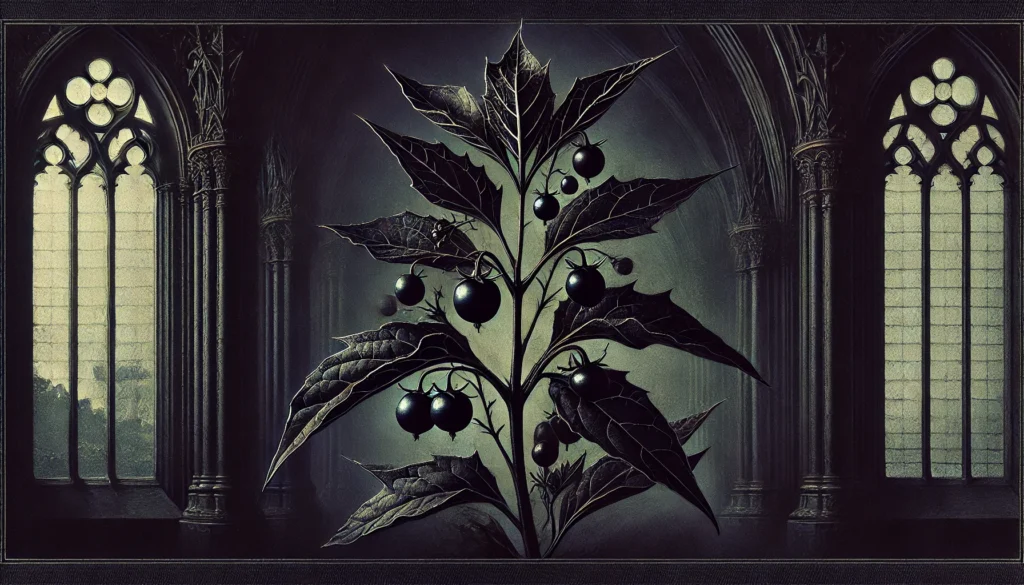

Home » Cat Plants » The Harm of Lily of the Nightshade Plant Can Cause to Cats

Nightshade (Solanum spp), also known as Deadly Nightshade, Black Nightshade, or Belladonna, is a highly toxic plant to cats that can be fatal if ingested. While cats are not typically allergic to nightshade, its toxicity poses a severe threat to their health and well-being.
Nightshade contains toxic alkaloids like solanine that can cause severe symptoms, including vomiting, diarrhea, and even seizures. This perennial herbaceous plant is native to Europe, North Africa, and Western Asia and is commonly found in disturbed areas, along roadsides, and in waste places.
Ingestion may cause mild gastrointestinal upset, but is generally not life-threatening.
Ingestion can result in mild symptoms like vomiting, diarrhea, or drooling. Rarely fatal but may require veterinary care.
Eating these plants can lead to more pronounced symptoms like abdominal pain, lethargy, or difficulty breathing. Veterinary intervention may be necessary.
Ingesting even small amounts can cause severe symptoms like organ damage, seizures, or cardiac failure without rapid treatment.
All parts of these plants are extremely poisonous to cats and can quickly lead to death, even with immediate veterinary care.
** Please note: Please note that toxicity level can vary based on the amount ingested and the specific cat. It's always best to keep these plants completely inaccessible to cats and seek immediate veterinary care or call the poison hotline if you suspect your cat has ingested any part of a toxic plant.
If a cat ingests any part of the nightshade plant, they may experience a range of symptoms. These can include:
immediately. Your veterinarian will likely follow these steps to diagnose and treat your cat:

A: Yes, Nightshade is highly toxic to cats. It contains toxic alkaloids like solanine that can cause severe symptoms, including vomiting, diarrhea, and even seizures.
A: If a cat ingests Nightshade, it may experience symptoms like vomiting, drooling, and loss of coordination. In severe cases, poisoning can lead to respiratory distress or death, so prompt veterinary care is essential.
A: Deadly Nightshade (Atropa belladonna) is considered more dangerous than other types of Nightshade for cats due to its higher concentration of toxic compounds like atropine. Even small amounts can be fatal, so avoid all forms of Nightshade around pets.
A: Even small amounts of Nightshade can be toxic to cats, causing serious health issues. The severity of poisoning depends on the amount ingested and the type of Nightshade, with symptoms ranging from mild gastrointestinal distress to life-threatening conditions.
A: If your cat eats Nightshade, contact your veterinarian immediately. Quick action can prevent more serious complications and increase the chances of a full recovery.
A: Yes, pet-safe alternatives to Nightshade include plants like Spider Plants and Boston Ferns. These plants are non-toxic and can create a beautiful garden without posing a risk to your cat.
Nightshade has a long and fascinating history. The plant has been used for centuries in traditional medicine, but its toxic properties have also been well-known. In ancient times, it was used as a poison and a hallucinogen. The name “belladonna” comes from the Italian phrase “beautiful woman,” as it was once used in eye drops to dilate women’s pupils, which was considered attractive.
Despite its dangerous nature, nightshade has been used in various medicinal applications, such as treating pain, inflammation, and muscle spasms. However, due to its high toxicity, its use is strictly regulated, and it should never be consumed without medical supervision.
Please note: The information shared in this post is for informational purposes only and should not be considered as veterinary medical advice.
🐾 A hilarious or heart-melting cat video
🐾 Our latest paws-on review of a cool cat toy